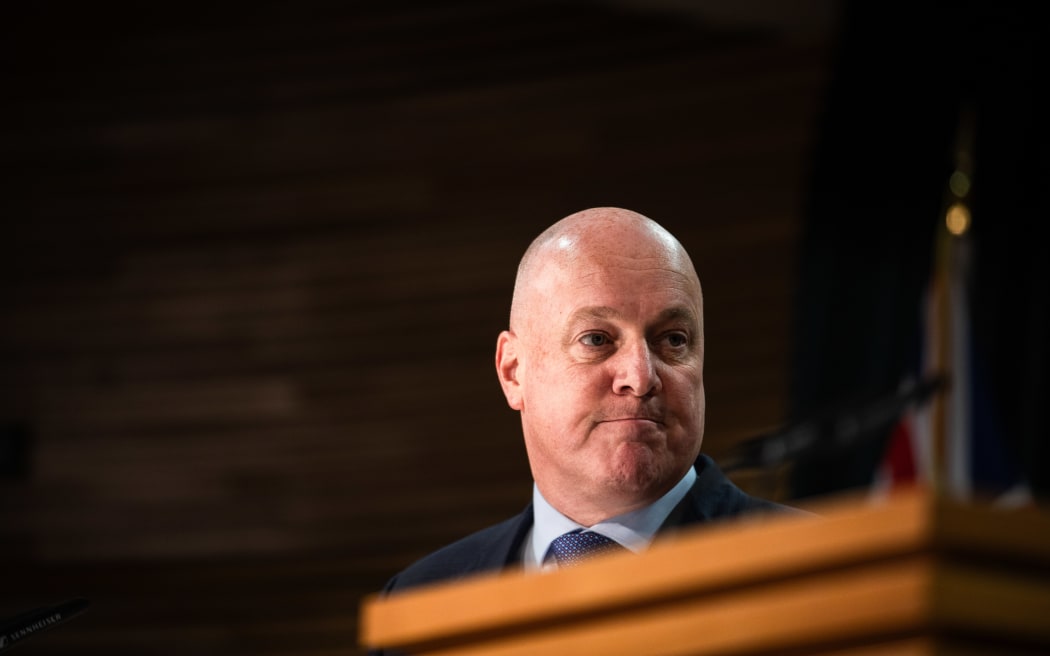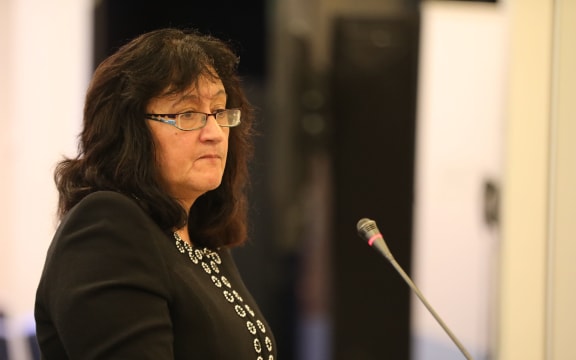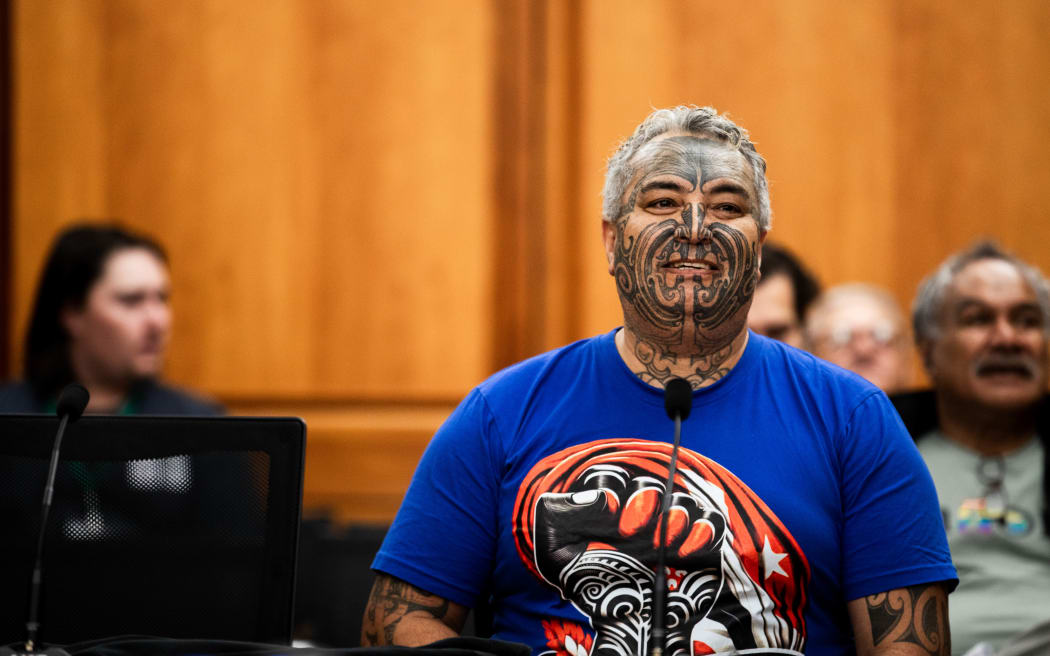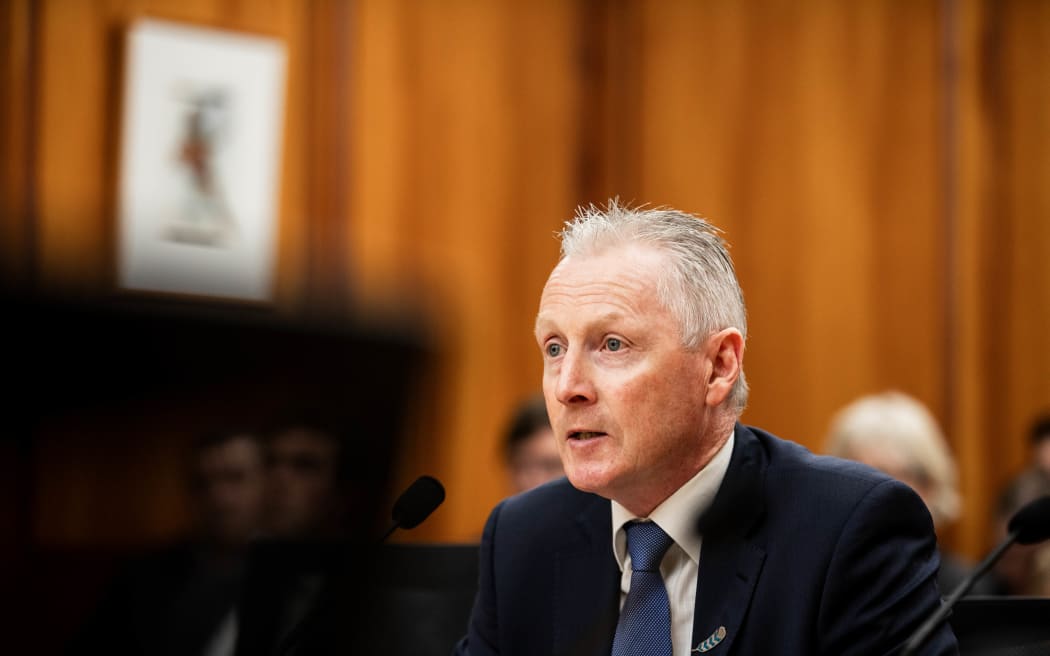
Prime Minister Christopher Luxon is being seen as being strong and decisive after demoting ministers. Photo: RNZ / Samuel Rillstone
Analysis - Prime Minister Christopher Luxon takes portfolios away from two ministers and it is seen as a stark message to the rest of the cabinet, there's courtroom drama as the government wins its case against the Waitangi Tribunal, the gang patch ban bill runs into opposition but the minister isn't deterred, and protests against fast-track consenting could become a problem.
Prime Minister Christopher Luxon's decision to dump Melissa Lee from Cabinet and take away Penny Simmonds' disability portfolio was seen as a stark warning to the rest of his ministers.
Lee was stripped of her broadcasting and communications portfolio and sent off to handle her remaining duties as a minister outside Cabinet.
Simmonds lost responsibility for disability issues but holds on to her other portfolios. She was already a minister outside Cabinet.
Lee had been very obviously struggling with broadcasting during recent upheavals in the sector and Simmonds had to apologise for the bungled announcement of cuts to disability services.
Justice Minister Paul Goldsmith has taken over broadcasting and Social Development Minister Louise Upston picked up disability issues.
Luxon's high standards
Luxon was seen as being strong and decisive, which won't do his image any harm at all.
"The prime minister's message is clear: if you're not up to the job, you don't keep it," said the Herald's political editor Claire Trevett. "It sends a stark warning to all ministers."
Her colleague Thomas Coughlan said it would be positive for Luxon.
The prime minister was likely to emerge stronger in the long term because his actions showed he wasn't going to tolerate a weak Cabinet, he said.
Political commentator Bryce Edwards, writing in the Herald, said Luxon had surprised everyone with his ruthlessness.
"Removing ministers for poor performance after only five months in the job just doesn't normally happen in politics," he said.
"That's refreshing and will be extremely well received. The public will perceive this unprecedented move as a sign Luxon has very high standards for his government and is determined that his ministers actually deliver results."
Luxon's reasons for taking action against the two ministers was reported by RNZ.
"This is how I roll, this is how I lead... I appreciate this may not be the way things have been done in the past here, but expect this to happen going forward as well," he said.
The changes were about making sure the government had "the right people on the right assignment at the right time... I want to make sure I've got my aces in their places".
Asked if it was a warning shot to others, he said he was just a person who would "adapt very quickly and dynamically to changing situations and circumstances".
He explained that broadcasting and disability issues had become a lot more complex in recent months. "I have come to the view it is important to have senior Cabinet ministers considering these issues."
Labour leader Chris Hipkins reacted with the tired old "wheels falling off" line, which he had to endure for months when his government lost five ministers in quick succession.
Hipkins said they shouldn't have been appointed in the first place because they were never up to the tasks they were given, which showed Luxon "didn't have particularly good judgement".
Time ticking for Waitangi Tribunal
Despite Parliament being in recess, this week was packed with drama.
The Waitangi Tribunal had caused great controversy by summoning the Minister for Children Karen Chhour to appear before it and explain why she intended to repeal a section of the Oranga Tamariki Act.
Section 7AA legally binds Oranga Tamariki to improve outcomes for tamariki Māori and demonstrate adherence to Treaty of Waitangi principles, RNZ reported.

Minister for Children Karen Chhour. Photo: RNZ / Angus Dreaver
Crown lawyers filed papers with the High Court last week in a bid to block the order and the hearing began on Monday.
The Crown claimed the summons was "unorthodox and unprecedented", and Oranga Tamariki officials had already provided enough evidence.
The tribunal's lawyers said the minister had consistently refused to provide evidence in person or via affidavit.
In his decision, Justice Andru Isac said the mana of the tribunal and the importance of its work was not diminished.
Crown Law had said Chhour planned to introduce the repeal bill in mid-May, at which point the tribunal would no longer have jurisdiction to consider it.
Stuff reported the tribunal would deliver its findings regardless of whether it could hear Chhour's explanation.
"That fact is a core reason why High Court Judge Andru Isac overturned the tribunal's summons, as it said it could proceed effectively without her," the report said.

Annette Sykes. Photo: RNZ / Patrice Allen
Lawyer Annette Sykes had confirmed to Stuff she would appeal the High Court's ruling, it said.
"But time is ticking for the tribunal, as Crown Law indicated Chhour plans to introduce the bill to repeal Section 7AA of the Aranga Tamariki Act in mid-May," the report said.
"Once Parliament has the bill, the Tribunal must cease its investigation into the issue."
Repealing Section 7AA is part of ACT's coalition agreement with National. The published agreement clearly states that it would "remove Section 7AA from the Oranga Tamariki Act".
Chhour is an ACT MP and when the summons was issued, ACT leader David Seymour suggested the tribunal should be "wound up for its own good".
New Zealand First's Shane Jones said it had overreached and was acting like an American star chamber.
Luxon said their comments were "ill-considered".
Gang patch ban, 'post-code policing'
Parliament's Justice Select Committee this week heard submissions on the government's Gang Legislation Amendment Bill, usually known as the gang patch ban bill.
When it is passed, as it surely will be, it will ban gang insignia in public places and give police greater powers to stop gang members congregating.
It has already been criticised, with Labour saying it would turn officers into "wardrobe police" and put more pressure on the stretched frontline.
"While police are 'broadly in favour', the government's proposed anti-gang laws are facing pushback from lawyers, rights groups and former gang members," RNZ's report on the select committee hearing said.
"Many are pointing to reports going back decades looking at the drivers of crime and gang membership, and calling for an approach that targets those."
The MPs on the committee heard submitters say it would likely not result in a reduction in gang members and crime.

Eugene Ryder makes an appearance at the select committee. Photo: RNZ / Samuel Rillstone
Media reports focused on the most colourful submitter, former gang member Eugene Ryder who arrived wearing three T-shirts bearing logos and insignia.
"He quizzed MPs, asking them which of these was a gang logo," Stuff reported.
"MPs refused to take part in the quiz, but Labour guessed it was the final blue one.
"But it was a trick question. 'It's actually a criminal offence to bring gang regalia into Parliament, so none of these are' said Ryder."
Ryder's evidence included a powerful account of his life experience.
He said he was no longer a gang member but Black Power remained his whanau.
"I was a state ward, I was abused while I was in care, and I found solace in the Black Power community here in Wellington... the people that were put in charge on behalf of the state to care for us were raping us. What we learned from that was violence, extreme violence."
Michael Laws, the former mayor of Whanganui who pushed for a localised gang patch ban, told the committee it led to a decrease in gang membership in the region.
But former National Party minister and Whanganui MP Chester Borrows, who helped the bill become law, said it had been ineffectual in practice.
It's always worth listening to police when they appear at hearings on proposed laws which they will have to enforce, because they know what it's going to be like.

Chris Cahill. Photo: RNZ / Samuel Rillstone
At this hearing was Police Association president Chris Cahill, RNZ reported.
He said law enforcement was broadly in support of the bill but it didn't come without fish hooks and likely would not work in the way most of the public assumed it would.
The idea that police would be able to go out and arrest people wearing gang patches was unrealistic.
"It's just simply not feasible in the vast majority of situations," he said.
"That would send a message that police aren't able to do their job... this would be a piece of legislation that would have to be used differently to that."
Cahill said gang members valued their patches very highly, and it was a disincentive if they knew that if they committed serious crimes or caused disorder police were going to turn up at their house with a search warrant and take their patches.
But he said it could also lead to "post-code policing", creating disparities in towns depending on the ratio of gang members to police officers.
Police Minister Mark Mitchell was undeterred by any of the evidence from submitters.
"We're going to be banning gang patches in our country," he told Morning Report.
Gangs believed they were above the law and the government wanted to send them a clear message that they were not, he said.
"If you want to wear a black T-shirt or a red T-shirt you go for it, but if they put swastikas and gang insignia and Mongrel Mob and Black Power and Head Hunters or whatever other gang you want, then it's gone."
Fast-track legislation facing bumps

RMA Reform Minister Chris Bishop and Transport Minister Simeon Brown Photo: RNZ/Marika Khabazi
Could public protests against the government's fast-track consenting legislation turn out to be a real problem for the government?
Yes it could, said the Herald's Claire Trevett in an article headed 'Government on the fast track to a reckoning'.
She noted that the press conference held by Transport Minister Simeon Brown and Infrastructure Minister Chris Bishop in Parnell last week took place against a background chorus of protesters.
"It will not be the last time they see those protesters," Trevett said.
"The fast-track legislation is rapidly shaping up as a problem for the government.
"Protesters and political opponents are easily dismissed as being those at one extreme of an issue. However, where it starts to get tricky is when suburban dwellers start to get furrowed brows."
Trevett said signs of government arrogance were appearing.
"Simply saying that you won the election, ergo you can do it, will only take your core supporters with you.
"One of the perils every new government faces is finding that balance between moving on the mandate you manage to get on election day - and taking the public with you."
There's a precedent for people power defeating government policy, and in mid-2010 it was a big story.
Here's a Herald report from May 2010: "An estimated 50,000 marchers joined one of the biggest protests in Auckland for decades today, to give the government a firm message to stay away from mining on conservation land."
Here's another from July 19, 2010: "Energy and Resources Minister Gerry Brownlee yesterday confirmed the government's complete retreat from proposals to allow mineral exploitation on 7068ha of protected conservation land on Great Barrier Island, the Coromandel Peninsula, and Paparoa National Park because of strong public opposition."
The government had said, before it gave up, that there were resources worth $140 billion under the protected land.
Now we have Regional Development Minister Shane Jones confidently saying what's going to happen. This quote is [from https://www.rnz.co.nz/news/national/514060/fast-track-bill-which-projects-could-be-approved-for-quicker-consent RNZ's comprehensive article] 'Fast-track bill: which projects could be approved for quicker consent':
"Gone are the days of the multi-coloured skink, the Kiwi, many other species that have been weaponised to deny regional New Zealand communities their right to a livelihood, their entitlement to live peacefully with their environment, but derive an income to meet the costs of raising families in regional New Zealand."
And another one: "If there is a mineral, if there is a mining opportunity and it's impeded by a blind frog, goodbye Freddy."
It's the sort of rhetoric that invites protest. Perhaps he shouldn't be quite so sure about Freddy's future.
*Peter Wilson is a life member of Parliament's press gallery, 22 years as NZPA's political editor and seven as parliamentary bureau chief for NZ Newswire.






